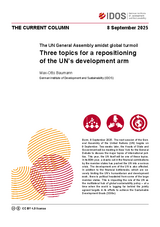The UN General Assembly amidst global turmoil
Three topics for a repositioning of the UN’s development arm
Baumann, Max-OttoThe Current Column (2025)
Bonn: German Institute of Development and Sustainability (IDOS), The Current Column of 8 September 2025
Bonn, 8 September 2025. The next session of the General Assembly of the United Nations (UN) begins on 9 September. Two weeks later, the Heads of State and Government will be meeting in New York for the General Debate to discuss the major topics of international politics. This year, the UN itself will be one of these topics. In its 80th year, a drastic cut in the financial contributions by the member states has pushed the UN into a serious crisis. The development arm of the UN is also affected. In addition to the financial bottlenecks, which are severely limiting the UN’s humanitarian and development work, there is political headwind from some of the large member states. This is impacting the role of the UN as the multilateral hub of global sustainability policy – at a time when the world is lagging far behind the jointly agreed targets in its efforts to achieve the Sustainable Development Goals (SDGs).
These adverse conditions do not change the need for sustainable development. It remains a challenge of our times as a factor in reducing the pressure on planetary boundaries, in securing prosperity, global public goods and a life in dignity for all. Multilateralism may currently be difficult, but in view of unresolved challenges and the lack of alternatives to the UN, the mandate of the UN Charter to ‘achieve international co-operation in solving international problems of an economic, social, cultural, or humanitarian character’ remains incontestable. Crises create room for manoeuvre and it is vital to harness this opportunity now.
In the past, the UN’s development work provided crucial support for developing countries, particularly during post-colonial nation-building and in the health sector. Yet the world has changed and the UN needs to move with the times. The comprehensive UN80 reform initiative launched by UN Secretary-General Guterres may primarily be a response to financial constraints, but it also offers an opportunity to reposition the UN. Three challenges need to be discussed.
(a) The functions of the UN’s development work need to be adapted to new requirements. Capacity deficits are often no longer the main problem. The withdrawal of US development aid in many countries has once again exposed dependencies on external assistance. As a result, support for countries’ own efforts is likely to become more important. The significance of cross-border challenges and (global) public goods has increased. Against this background, the UN’s development work should focus less on implementing small-scale projects than on core multilateral functions: supporting national decision-making processes by providing advice based on global monitoring, the analysis of best practices, and international norms and standards.
(b) A more inclusive form of global governance is required that involves all member states on an equal footing. With its distinction between ‘programme countries’ on the one hand and ‘donors’ on the other, the UN’s development work posits a North–South divide that increasingly fails to reflect reality in political, economic and normative terms – just as the global challenges themselves cannot be divided up. The countries of the Global South are rightly demanding more voice and representation in the UN, particularly on topics on which the policies of one group of countries have (negative) impacts on the development opportunities of another group. The UN can support global governance processes of this nature by conducting monitoring and analyses on global challenges, helping member states to depoliticise issues.
(c) The financing of the UN development system needs to be reformed to address these changes. The share of contributions that donors earmark for particular purposes has been increasing since the 1990s. Earmarked contributions accounted for 81% of funds in 2023 and look set to grow as geopolitical tensions increase. Earmarked funding on this scale should be identified as a problem of conflicting goals. It allows donors to exercise direct influence; at the same time, it undermines the effectiveness of the UN’s development work, the mandated functions and, above all, the egalitarian nature of UN multilateralism. What is really needed is stable core financing, on the use of which UN entities can decide by themselves within the scope of their mandates and adapted accountability structures.
Moves to reposition the UN’s development arm are not utopian. The financial cuts could mark an opportunity to focus the UN’s activities to a greater extent on key multilateral functions that are less expensive and perhaps also more effective than project work with its high transaction costs and large throughput of funds. Active steps must be taken to shape how this shift from aid to cooperation is achieved. The benchmark in future should be how the UN can grow in political and not financial terms.
Here, too, opportunities can be harnessed. If the UN’s development work were to focus on the group of Least Developed Countries and low-income countries, as conventional development support does, its global relevance would decline in proportion to the drop in the number of such countries. The UN should thus particularly also serve the development-related global governance interests of the 105 nations currently classed as middle-income countries – a group of countries that, collectively, can act as a counterweight to superpowers and could hence become a key resource for UN multilateralism.


